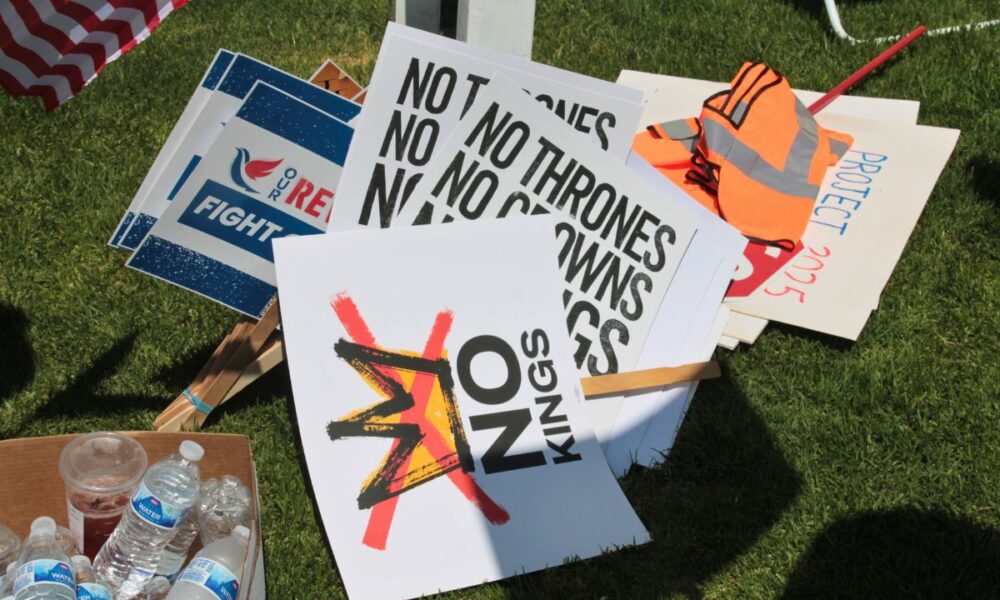As the government shutdown remains unresolved and debates intensify over immigration policies across the nation, many are preparing to take to the streets once again for the second wave of “No Kings” protests.
Organizers have previously described the movement as a stand against what they see as unchecked executive power, while other political leaders warn of continued violence under the cloak of “protesting.” Questions are being asked about outside groups that are fueling and funding such gatherings.
The first round of “No Kings” mobilizations in June drew an estimated five million people nationwide, coinciding with a collection of Trump’s executive orders issued throughout the early months of his second term. This weekend, more than 2,500 events are reportedly planned across all 50 states, up from about 2,000 last time, according to the official No Kings website.
Organizations like the Indivisible Project are leading the charge to organize the protests.
Indivisible, formed after Trump’s 2016 presidential win, has become a significant player in the progressive political network, known for partnering with organizations such as the Democratic Socialists of America, which has direct links to Antifa.
Its website highlights the message that “we don’t do kings.” Co-founder Leah Greenberg has previously described the movement as a pushback against “authoritarianism and corruption,” encouraging supporters to mobilize locally through various online platforms. Additionally, she has allegedly continued weekly online calls to organize participants for this weekend.
Reports are swirling that billionaire George Soros’ Open Society Foundations have poured millions into Indivisible, as seen in a post by X user WallStreetMav, fueling claims that these aren’t just organic uprisings.
In Texas, tensions are particularly high after the first round of “No Kings” protests.
Gov. Greg Abbott has activated the National Guard in Austin, citing concerns about the “Antifa-linked” protest and how it could potentially cause significant disruptions.
“Violence and destruction will never be tolerated in Texas,” Abbott said. “Today, I directed the Texas Department of Public Safety and Texas National Guard to deploy all necessary law enforcement officials and resources to ensure the safety of Austin residents. Texas will deter criminal mischief and work with local law enforcement to arrest anyone engaging in acts of violence or damaging property.”
Other Republican leaders have been equally vocal.
House Speaker Mike Johnson has linked the rallies to the ongoing federal shutdown, describing participants as a mix of “Marxists, socialists, and Antifa advocates,” per WUSA9 News.
U.S. Sen. Roger Marshall (R-KS) has also suggested that more National Guard deployments could be necessary if the demonstrations turn chaotic once again.
Trump’s team continues to push back against what it calls political smear campaigns and legal interference. Recent court rulings have blocked some National Guard deployments, including one in Illinois reported by ABC News, where judges said no amount of “rebellion” justified the safety measure.
Analysts at the Brennan Center for Justice have also argued that using troops against protesters risks violating constitutional rights.
Some officials, like Treasury Secretary Scott Bessent, claim the “No Kings” protests could further delay shutdown negotiations, but organizers insist the rallies were planned months ago.
“If, in fact, they are waiting for this ‘No Kings’ protest, you know, ‘no kings’ means no paychecks. No paychecks and no government,” Bessent said, per The Hill.
While some organizers say the “No Kings” movement honors America, critics see it as deepening the nation’s political divide with a potential wave of violence in its midst. Across the country, leaders like Abbott and Virginia’s Glenn Youngkin are preparing security measures to try to keep the events as peaceful as possible.
The Dallas Express will be present at a “No Kings” protest happening in DFW this weekend to inform readers about any effects the event may have on the city.


